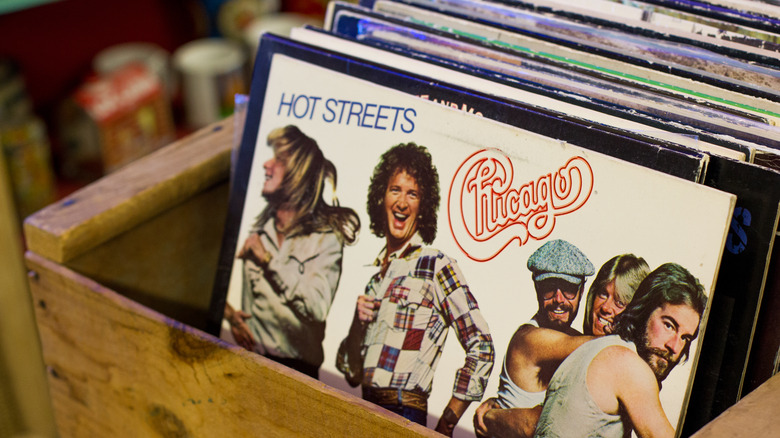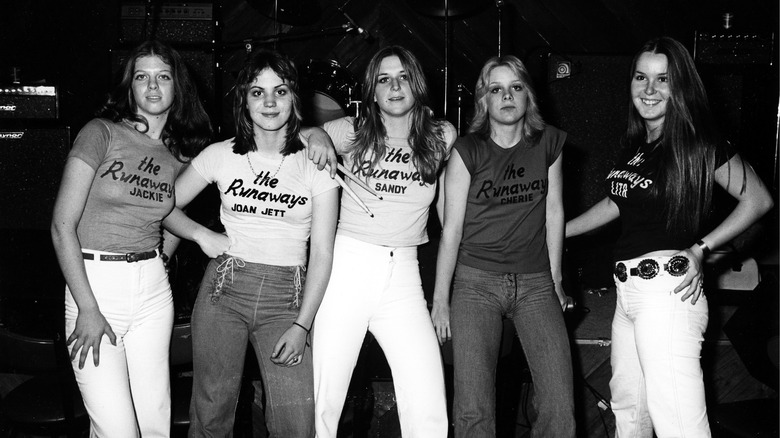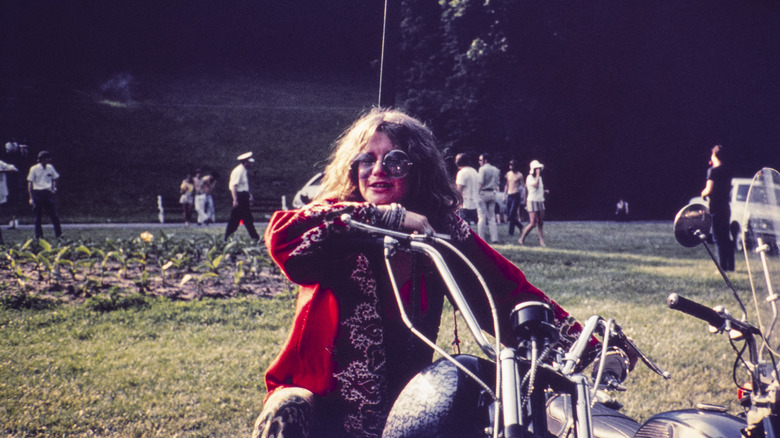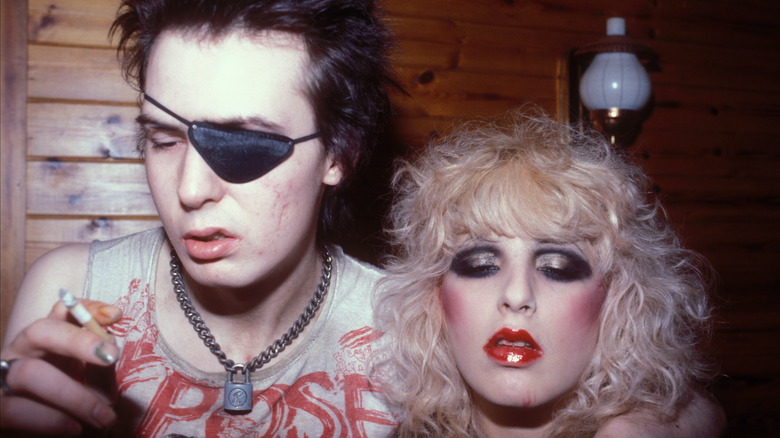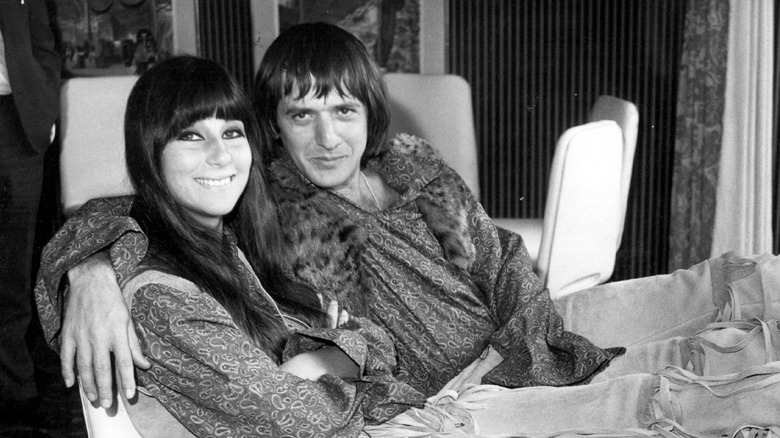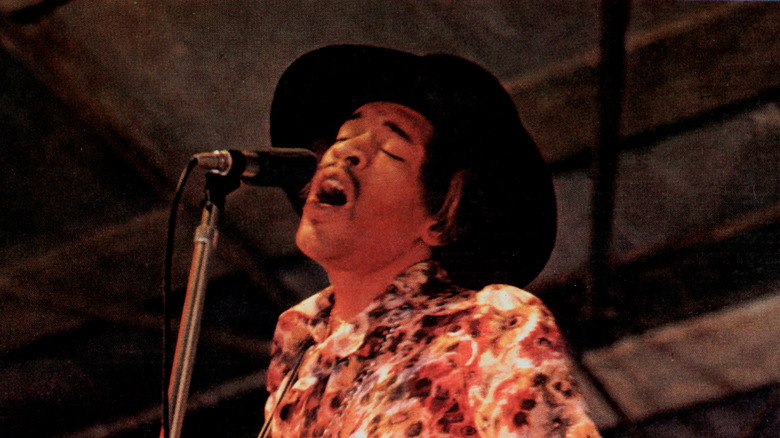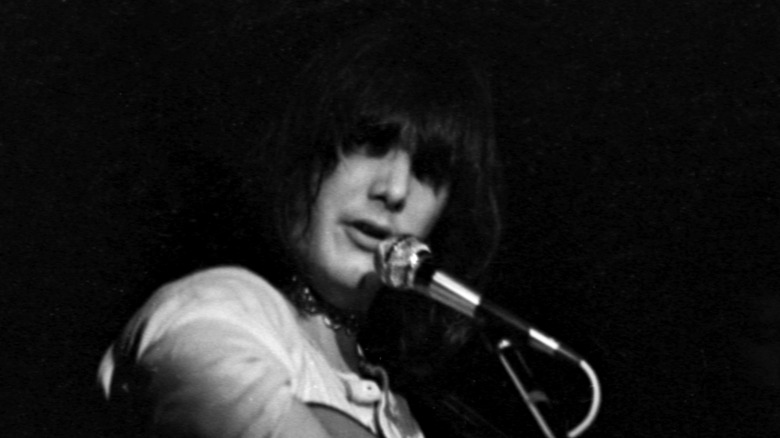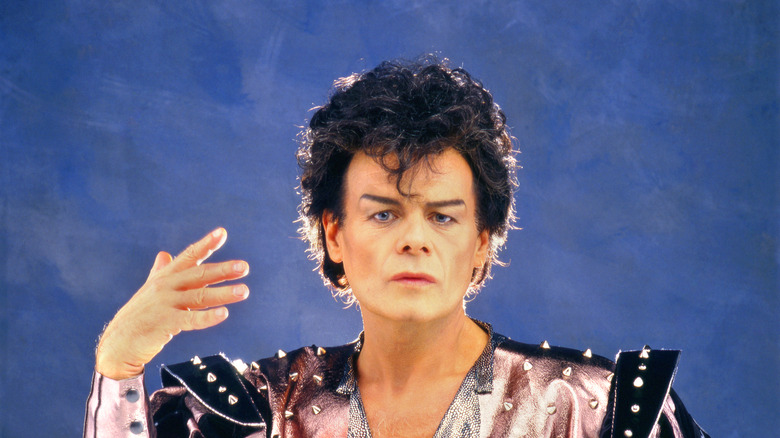The Messed Up Truth About The 1970s Music Industry
It's no secret that the 1970s were filled with sex, drugs, and rock 'n' roll — at least as far as the music industry goes. The Beatles' gently skirting the edge (as Rolling Stone notes) in the late 1960s was cute in comparison to Iggy Pop's performances with The Stooges in the 1970s. The music was louder, heavier, and less forgiving. Tragically, so was the whole music industry at the time. Managers and producers scammed their bands, musicians struggled with substance use, and several men partook in the abuse of very young and even underage women.
As NPR reports, a teenage Lori Maddox was assaulted by Led Zeppelin guitarist Jimmy Page, who hid her at L.A.'s Hyatt House hotel to keep the fact hidden. Big figures in the music industry were protected while their victims were quiet and helpless. When Badfinger's Pete Ham took his own life, he left a note reading, "Stan Polley is a soulless bastard. I will take him with me" (via Far Out). While the 1970s were filled with exceptional music breakthroughs and style developments, they remain ridden with stories of abuse.
The following article contains descriptions of addiction, sexual assault, and suicide.
Jackie Fuchs was assaulted by her manager
In 1975, Jackie Fuchs was 15 years old when she was spotted in L.A. and invited to music entrepreneur Kim Fowley's apartment. As Huffington Post reports, Fowley was just in the process of creating an all-female band, and he had sent Rodney Bingenheimer to collect young, pretty women. This is how the Runaways were formed, and their manager was the man that posted this ad in Back Door Man magazine in June 1975.
Fowley had a pattern of assault — that same year he assaulted and abused an 18-year-old young woman and a 14-year-old girl. Sadly he would focus his attention on Fuchs at a 1975 New Year's Eve party, held in a motel following a quasi-successful Runaways show. Fuchs was force-fed multiple Quaaludes and raped by Fowley, too weak to fight him off. She just remembers the moment she realized what was happening: "I remember opening my eyes, Kim Fowley was raping me, and there were people watching me."
Because none of the bandmates even addressed the situation afterward, Fuchs felt she couldn't speak up as no one would back her: "I was going to be the one that ended up on trial more than Kim. I carried this sense of shame and of thinking it was somehow my fault for decades."
If you or anyone you know has been a victim of sexual assault, help is available. Visit the Rape, Abuse & Incest National Network website or contact RAINN's National Helpline at 1-800-656-HOPE (4673).
Underage groupies were the norm
Sadly, the Runaways' story isn't a stand-alone atrocity in the 1970s music industry. This was the decade when R. Dean Taylor released his song "Shadow:" "Body of a woman, mind of a child / Shadow, you sure do drive me wild / You're only 14 years old." Men having relationships with underage girls (and sexual intercourse with underage groupies) was so normalized at the time, that no one batted an eyelid over lyrics such as Taylor's.
As per Rolling Stone, Jimmy Page famously dated groupie Lori Maddox for a few years. Maddox was 14 years old when she met Page — he knew this, and he tried to hide this. According to NPR, Page kept Maddox locked in his room at the Los Angeles Hyatt House hotel, all too aware that he was committing statutory rape. Still, although the couple eventually became a common sight at Led Zeppelin's parties, Page was never held accountable for the relationship.
Then there was Elvis Presley. As Vice reports, Presley had always had a penchant for pursuing underage girls. and in 1959, he met 14-year-old Priscilla Presley was only 14 years old when she met him in 1959. Following their divorce in 1973, Presley went on to date another 14-year-old, Reeca Smith.
Overdoses were almost expected of rockstars
In the fall of 1970, Janis Joplin was working on what was going to become her best-selling LP: "Pearl" (via History). Four years before, she had come to San Francisco and quickly turned from a drifter into a prolific singer, too loud or brave to stay with her first band, Big Brother and the Holding Company. As per Society of Rock, on October 4, road manager John Cooke went to check on Joplin after she had failed to turn up to a meeting. Cooke found her dead as a result of a heroin overdose. Less than a month before, Jimi Hendrix had also died of a drug overdose. He asphyxiated on his own vomit in his sleep, following yet another night of combining dangerous drugs.
The 1970s continued to be ridden with overdose deaths in the world of musicians. On July 3, 1971, The Doors frontman Jim Morrison died inside the bathtub of his Paris apartment from heart failure, with many believing he accidentally overdosed on heroin (via The Washington Post). In 1977, Elvis Presley was found dead in his bathroom as well. As per Society of Rock, an autopsy revealed he had 14 drugs in his system at the time of his death. And these are just a few of the rock artists who overdosed in the 1970s.
If you or anyone you know is struggling with addiction issues, help is available. Visit the Substance Abuse and Mental Health Services Administration website or contact SAMHSA's National Helpline at 1-800-662-HELP (4357).
Sid and Nancy
The Sex Pistols put the "sex" in "sex, drugs, and rock 'n' roll," but their bassist Sid Vicious did much darker things, too. Tragically, Vicious' mother was a heroin addict, and, according to The Independent, she supplied him with the drug as well. Just as he was climbing the ranks of the music world in 1977, Vicious began a relationship with a groupie, Nancy Spungen (via the Los Angeles Times). Their relationship was tumultuous, to say the least — they would burn each other's arms with cigarettes, abuse substances, and physically fight, reports The Independent.
It all culminated on October 12, 1978, when Spungen was found dead following a stab to the stomach. When the police arrested Vicious on suspicion of murder, he said, "I did it ... Because I'm a dirty dog." He then retracted his statement and went with another story instead — he had taken 30 Tuinal tablets, so he was fast asleep when Spungen died.
Altough he was bailed out, Vicious never recovered from Spungen's death. Spungen's mother remembers Vicious saying he had lost the will to live, and on one occasion, he tried taking his own life by slitting his wrists, as per the L.A. Times. As The Independent reports, on February 2, 1979, Vicious died of a heroin overdose. He was 21. Although the full reality of Spungen's death will never be known, the famous couple's story is a dark lesson.
Sonny and Cher endured a horrible marriage for the cameras
When Cher met fellow musician Sonny Bono in 1963, she was 16 years old and he was 12 years her senior (via Biography). Cher's own mother told Ladies' Home Journal in 1975 that Bono was a father figure before he was a lover to Cher. But the two became a star couple following their 1965 hit single, "I Got You Babe." By 1971, two years after getting married, they had their own variety show, "The Sonny & Cher Comedy Hour." The TV program showed the couple's family life, and it would end with them singing "I Got You Babe" to each other. It was a hit, and the couple needed it badly — by now, they had a child and financial issues as a result of a failed movie project.
But the show was selling a lie. Cher told Vanity Fair in 2010 that Bono was a not a very good partner. "I wouldn't have left him if he hadn't had such a tight grip— such a tight grip." But Bono had double standards: He often cheated on his wife, and, by 1973, he was living with another partner (via Biography). But he and Cher endured a few more years of the toxic marriage for the sake of their show. Eventually, they got divorced in 1975 — as expected, the interest in their show plummeted quickly.
Queen were scammed by their manager (and they weren't alone)
Nowadays, Queen are known as one of the most prolific rock bands in history. But although they produced hit tunes from the very beginning, in 1975, they were broke. Why? As per Far Out Magazine, drummer Roger Taylor commented that they could barely afford buying new drumsticks: "You see them [the management] running around in stretch limos and think 'hang on there's something not right here!'"
Indeed, something wasn't right. Trident Studio owner Norman Sheffield, who was Queen's manager at the time, was making a lot of money off Queen's tracks and finding ever fresher ways to get out of paying the band. When the reality of Sheffield's fraud dawned on Freddie Mercury, Queen left Trident Studios. Frustrated and bitter, Mercury wrote an exceptional song for the "A Night at the Opera" album — "Death on Two Legs." Its lyrics are pretty obvious: "You've taken all my money, and you want more / Misguided old mule with your pigheaded rules." However, listeners didn't know who the song was dedicated to until Sheffield himself came out of the shadows and sued the band for defamation. A settlement was reached outside the court, but as a result of the lawsuit, Sheffield became the master of his own demise –- people knew him for what he was. Unfortunately, Queen weren't alone in being seriously scammed by their managers in the 1970s.
Badfinger's manager took advantage of the band, with tragedy following
If there is a contest for the worst band manager ever, Stan Polley probably tops Norman Sheffield. In the mid-to-late 1960s, Badfinger (at the time known as the Iveys) became the first-ever band to be signed by Apple Studios after The Beatles (via Louder). Paul McCartney particularly appreciated their style and took the band under his wing, to the extent that Badfinger became known as "the new Fab Four." McCartney wrote Badfinger's "Come And Get It" — the song would reach No. 4 in the United Kingdom after its release in 1970. But the United States was overall more enthusiastic about the band.
Excited about their popularity in the U.S., Badfinger entrusted their finances to manager Stan Polley. Polley was not just greedy — as Salon reports, he took away all the band's money and left behind a contract that made it impossible for them to make any more money without him. As Louder notes, Tom Evans wrote the songs "Hey Mr Manager" and "Rock 'n' Roll Contract" to channel his frustrations.
But on the morning of April 24, 1975, frontman Pete Ham died by suicide. He had a pregnant wife and a freshly bought house that he could not afford. On his suicide note, he called out Polley for his wrong doing. Indeed, Polley tried to cash in Ham's life insurance afterward, according to Salon. Eight years later, Tom Evans died by suicide as well, after repeatedly saying he wanted out as well.
There's a chance Jimi Hendrix was murdered by his manager
Jimi Hendrix sadly joined the 27 Club (the infamous list of musicians who died at the age of 27) on September 18, 1970, as Society of Rock reports. The story was quite clear: His girlfriend Monika Dannemann had found him unresponsive in the morning, after a night of overindulging in illegal substances. But according to Louder, the story behind Hendrix's death is much murkier than that.
In 1973, Hendrix's former manager, Mike Jeffery, was chatting to roadie James "Tappy" Wright when he made a very disturbing confession, as remembered by Wright: "As we are talking, Mike began to get very agitated and pale. 'I had no bloody choice, I had to do it. ... You know exactly what I'm talking about. It was either that or I'd be broke or dead.'" Jeffery then went on to say something along the lines of getting some nasty friends to pour "booze down the windpipe." In an even creepier twist, the following month, Jeffery was found dead. It turns out Jeffery had ties to the Mafia, and debts that he had been threatened about before. Although his confession was never investigated or officially connected to Hendrix's death, it definitely adds a tragic layer to the rockstar's story.
Gram Parson's body was stolen
Singer-songwriter Gram Parsons died from a heroin overdose in September 1973, as All Music confirms. But the tumultuous rock 'n' roll life continued to haunt Parsons after his death, in a very strange way. As per Louder, on September 20, two drunk men wearing cowboy hats stole Parsons' corpse and drove it to Joshua Tree, California. These were Phil Kaufman, Parsons' manager, and a friend of his. As he confessed to Louder, "He was en route to Continental Airlines at LAX, from where he would be shipped back to his step-father in New Orleans." But Kaufman was adamant Parsons would not have wanted to be buried in Louisiana. A few months before Parsons died, he told Kaufman, "If I die I want somebody to have a few beers, take me out to the desert and burn my body." The two made a pact that night: They would make sure the other would get buried in the desert.
So Kaufman drove Parsons' corpse to Joshua Tree and set his casket on fire. Needless to say, this earned him a fine of $300 (via The Current). However, as there was still no law against stealing a corpse, Kaufman and his friend were only fined for stealing the casket.
Racist slurs could be heard among musicians
On March 15, 1979, the Stephen Stills Band and Elvis Costello happened to stay at the same Holiday Inn in Columbus, Ohio, after both of them played shows that night (via Ultimate Classic Rock). At its bar, Costello got intoxicated and started picking on the members of the Stephen Stills Band. Eventually, the band left the bar except the backing singer, Bonnie Bramlett. As she taunted Costello, he showed an even uglier side, revealing his feelings on race in America. He yelled out racial slurs against James Brown and Ray Charles. Yep. Twice in a night. Soon enough, the two got into a brawl.
After Bramlett went to the press, Costello offered an excuse, but not an apology: "It became necessary for me to outrage these people with the most offensive and obnoxious remarks I could muster to bring the argument to a swift conclusion and rid myself of their presence" (via UCR). He also said he was drunk and tired from touring, but that is hardly an excuse for being racist.
Gary Glitter was a notorious pedophile
The 1970s music industry, unfortunately, was full of criminal and vicious characters. One such character was Paul Gadd, stage name: Gary Glitter. As per National World, Glitter abused three young girls between 1975 and 1980. Unfortunately, this was not discovered until 2012, following a U.K. investigation initiative after the Jimmy Saville scandal. Detective Chief Inspector Michael Orchard commented on Glitter's callousness (via Rolling Stone): "Paul Gadd has shown himself to be a habitual sexual predator who took advantage of the star status afforded to him by targeting young girls who trusted him and were in awe of his fame. His lack of remorse and defense that the victims were lying makes his crimes all the more indefensible."
In 2015, Glitter was convicted of one count of attempted rape, four counts of indecent assault, and one count of sexual intercourse with a girl under the age of 13. He was sentenced to 16 years in prison.
